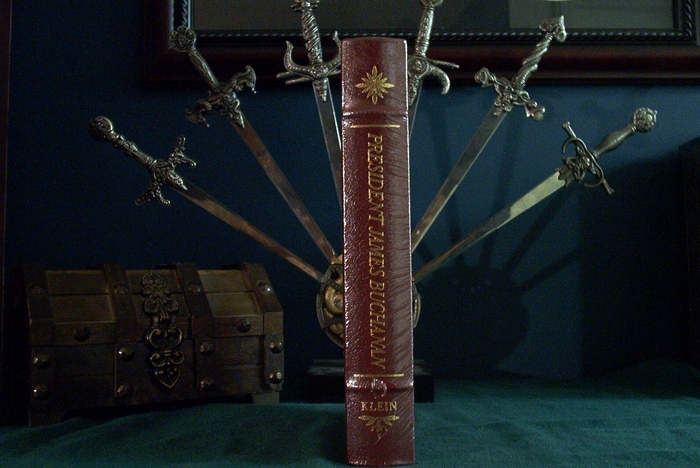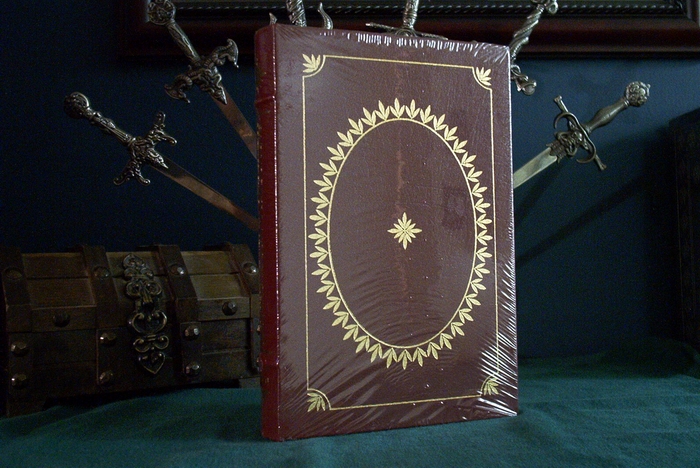Easton Press James Buchanan books
President James Buchanan - Philip Shriver Klein - 1987President James Buchanan biography
James Buchanan (1791-1868), fifteenth President of the United States, born near Mercersburg, Pa., and educated at Dickonson College, Carlisle, Pa. He began to practice law in 1812, and became prominent both as a lawyer and a political leader. He served in the State legislature (1815-16) and the U.S. House of Representatives (1821-31). As U.S. minister to Russia (1832-1834), James Buchanan negotiated the first commercial treaty between the United States and that country. From 1834 to 1845 he served in the U.S. Senate, and during the administration (1845-49) of President James Polk he was secretary of state; his most notable achievement in the later post was the settlement of the Oregon boundary dispute with Great Britain in 1846 on terms satisfactory to the United States. James Buchanan was ambassador to Great Britain from 1853 to 1856; in the later year he nominated for the Presidency by the Democratic Party, and was elected against the opposition of the "Know Nothing" (q.v.) candidate of the nearly organized Republican Party.
During President James Buchanan's administration the slavery question steadily increased in gravity. President James Buchanan strongly favored the maintenance of slavery; his cabinet was composed mostly of advocates of the system, and he publicly supported proslavery elements in their attempt to establish Kansas as a slave State. As the close of his term approached it became evident an open, armed conflict was impending, and the election of Abraham Lincoln to the Presidency in November,
As the 15th President of the United States, Buchanan faced the daunting challenge of navigating the nation through the turbulent waters of the pre-Civil War era. The issue of slavery had reached a fever pitch, and the country stood sharply divided along regional lines. Buchanan, a Democrat with a lengthy resume that included serving as a senator, secretary of state, and ambassador, brought a wealth of experience to the presidency.
However, it was during this critical period that Buchanan faced one of his most controversial moments. In 1860 President James Buchanan asserted a stance that would later be heavily criticized. Faced with the secession of Southern states following the election of Abraham Lincoln, Buchanan maintained that secession was illegal but believed that the federal government lacked the authority to forcibly prevent it. This position, marked by a sense of constitutional restraint, earned both praise and condemnation.
1860, deepened the crisis. On December 20, 1860, South Carolina formally seceded from the Union, but President Buchanan, hopeful of negotiating a settlement with the South, refused to employ coercive measures. Buchanan's cabinet, torn by the sectional disputes of the day, quickly broke up. In the closing weeks of President James Buchanan's administration the indecision and inactivity of the Federal government allowed the seceding southern States to gather their forces, and most of forts and arsenals in those States were seized during the winter. After his retirement from office James Buchanan took no part in public affairs, though during the remaining years of his life he supported the Union cause in the Civil War. In 1866 he wrote a defense of his administration.
President James Buchanan - A Biography by Philip Shriver Klein
Philip Shriver Klein's President James Buchanan: A Biography stands as a definitive account of one of America's most enigmatic leaders. Through meticulous research and insightful analysis, Klein offers readers a comprehensive exploration of James Buchanan's life, from his humble beginnings to his tumultuous presidency. Born on April 23, 1791, in Cove Gap, Pennsylvania, James Buchanan came of age during a time of profound transformation in the United States. Raised in a family of modest means, he distinguished himself through his intellect and ambition, eventually pursuing a career in law and politics. Klein delves into Buchanan's early political career, tracing his rise through the ranks of the Democratic Party and his tenure in various government positions, including as a congressman, senator, and diplomat. Buchanan's diplomatic experience, particularly his service as Minister to Great Britain, shaped his worldview and prepared him for the challenges he would face on the national stage.
In 1856, James Buchanan secured the Democratic nomination for President, positioning himself as a compromise candidate capable of uniting a fractured party and country. His election as the 15th President of the United States marked a significant milestone in American history, as Buchanan became the only president to hail from Pennsylvania and the last to be born in the 18th century. Klein provides invaluable insights into Buchanan's presidency, which unfolded against the backdrop of mounting tensions over slavery and the looming specter of secession. As President, Buchanan grappled with a series of crises, including the Dred Scott decision, the violence in Kansas, and the secession of Southern states following Abraham Lincoln's election in 1860. Throughout his presidency, Buchanan's attempts at conciliation and compromise often fell short, as he struggled to navigate the deepening divide between North and South. Critics have faulted Buchanan for his perceived indecisiveness and his failure to prevent the outbreak of the Civil War, while others have praised his commitment to upholding the Constitution and preserving the Union.
In President James Buchanan: A Biography, Philip Shriver Klein offers a nuanced portrait of a complex and controversial figure. By examining Buchanan's personal life, political career, and presidential legacy, Klein invites readers to reassess their understanding of one of America's most enigmatic leaders and the pivotal era in which he lived.
James Buchanan quotes
"All the rights secured to the citizens under the Constitution are worth nothing, and a mere bubble, except guaranteed to them by an independent and virtuous judiciary."
"I like the noise of democracy."
"The ballot box is the surest arbiter of disputes among freemen."
"The ballot box, the jury box, and the cartridge box are now all being used, but if the first two don't succeed, the third will be a necessity."
"If you are as happy, my dear sir, on entering this house as I am on leaving it and returning home, you are the happiest man in this country."


Comments
Post a Comment
Share your best book review and recommendation